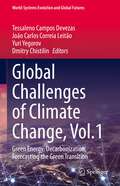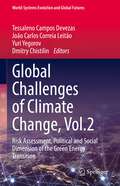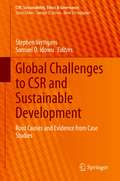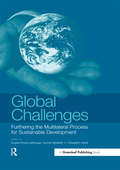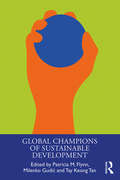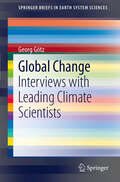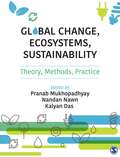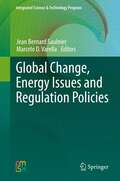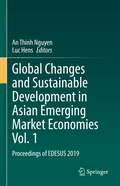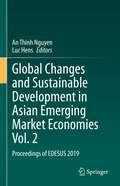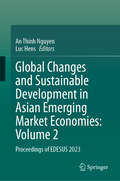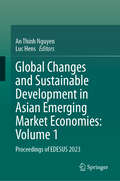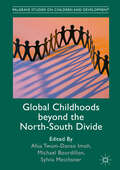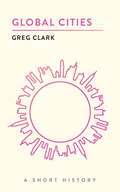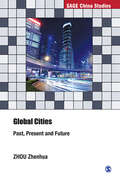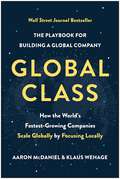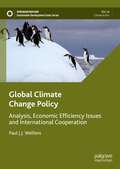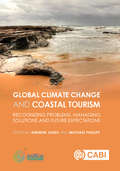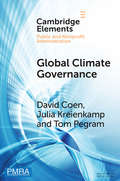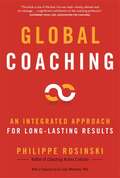- Table View
- List View
Global Challenges in Responsible Business
by N. Craig Smith C. B. Bhattacharya David Vogel David I. LevineCorporate responsibility has gone global. It has secured the attention of business leaders, governments and NGOs to an unprecedented extent. Increasingly, it is argued that business must play a constructive role in addressing massive global challenges. Business is not responsible for causing most of the problems associated with, for example, extreme poverty and hunger, child mortality and HIV/AIDS. However, it is often claimed that business has a responsibility to help ameliorate many of these problems and, indeed, it may be the only institution capable of effectively addressing some of them. Global Challenges in Responsible Business addresses the implications for business of corporate responsibility in the context of globalization and the social and environmental problems we face today. Featuring research from Europe, North America, Asia and Africa, it focuses on three major themes: embedding corporate responsibility, corporate responsibility and marketing, and corporate responsibility in developing countries.
Global Challenges of Climate Change, Vol.1: Green Energy, Decarbonization, Forecasting the Green Transition (World-Systems Evolution and Global Futures)
by Tessaleno Campos Devezas João Carlos Correia Leitão Yuri Yegorov Dmitry ChistilinThis two-volume book offers a broad range of discussions on the immense challenge of climate change, one confronting every country on the planet and forcing them to find a path towards a sustainable future that will not have disastrous consequences in relation to our chances of survival. It also presents a snapshot of the status quo, which reflects all the decisions and measures taken to date. Analyzing the consequences of the steps that will shape our future, the two volumes also reflect on important decisions at a global level that have already been taken. In this first volume on green energy, decarbonization, and forecasting the green transition, respected international scholars analyze various technical aspects of and alternatives to the so-called “green energy transition,” as well as measures intended to help reach the ambitious goal of net zero emissions within the next thirty years. Throughout the 13 chapters, the authors forecast future scenarios for the use of alternative energy sources. Additionally, the book discusses questions regarding the suitability of current measures and presents innovative alternatives that have remained largely overlooked.This book is a must-read for scholars, researchers and students, as well as policymakers interested in a better understanding of climate change, present scenarios, and alternative solutions and measures.
Global Challenges of Climate Change, Vol.2: Risk Assessment, Political and Social Dimension of the Green Energy Transition (World-Systems Evolution and Global Futures)
by Tessaleno Campos Devezas João Carlos Correia Leitão Yuri Yegorov Dmitry ChistilinThis two-volume book offers a broad range of discussions on the immense challenge of climate change, one confronting every country on the planet and forcing them to find a path towards a sustainable future that will not have disastrous consequences in relation to our chances of survival. It also presents a snapshot of the status quo, which reflects all the decisions and measures taken to date. Analyzing the consequences of the steps that will shape our future, the two volumes also reflect on important decisions at a global level that have already been taken. This second volume on risks assessment and the political and social dimension of the green energy transition is structured into 14 chapters. International renowned scholars discuss the inherent risks that arise in consequence of the transition to the intensive use of low carbon energy sources and global warming, risks related to food and water security, as well as risks of social and political conflicts. They further examine the dependence on individual countries' industrial structures and on their socio-economic development level as challenges to climate change solutions and to the global energy policy agenda.This book is a must-read for scholars, researchers and students, as well as policymakers interested in a better understanding of climate change, present scenarios, and alternative solutions and measures.
Global Challenges to CSR and Sustainable Development: Root Causes and Evidence from Case Studies (CSR, Sustainability, Ethics & Governance)
by Samuel O. Idowu Stephen VertigansThis book examines and analyzes the challenges programmes for Corporate Social Responsibility (CSR) and sustainable development are facing in global management practice. It looks at the dichotomy of a general and popular demand for responsible and resilient management, and the counterplayers that impact the positive effect of such efforts. The book assembles latest research looking at the root causes for this opposition, and new case studies that showcase the dilemma and possible solutions to overcome it. Overall, the book juxtaposes short terminism within CSR programmes and longer term sustainable development, mis-allocation of resources and failed promises associated with CSR, and sketches pathways how CSR and sustainable development can be directed towards the most pressing issues.
Global Challenges: Furthering the Multilateral Process for Sustainable Development
by Angela Churie Kallhauge, Gunnar Sjöstedt and Elisabeth CorellThe World Summit on Sustainable Development (WSSD) in Johannesburg 2002 was the latest conference in an international process to manage environment and development issues that can be traced back to the late 1960s. Three milestones mark this 30-year process of social and political interaction: the United Nations Conference on the Human Environment (UNCHE), held in Stockholm in 1972, the first international meeting at a high political level convened to address environmental issues; the 1992 United Nations Conference on Environment and Development (UNCED), held in Rio de Janeiro; and the WSSD, which attempted to set policy goals and targets for the global environmental and developmental challenges previously identified.But what did the WSSD achieve? Following the summit there have been various opinions of its significance and its outputs, many of them negative. This book argues that there is a need to place the WSSD in its broader context. Understanding the connections between the WSSD and its precedents as well as those between this overall process and individual environmental decision-making processes (such as on climate change), and how they all contribute to the overall global policy process, adds a critical dimension to the analysis of the WSSD outcomes.This book examines the challenges facing the global policy process for sustainable development as it continues beyond Johannesburg into the future. It combines a forward outlook with a historical perspective in tracing the evolution of selected cross-cutting themes on the agenda of the three conferences, the institutions and formal results of the process, and the actors and their patterns of interaction over time. The focus is on the decision-making dimension – the multilateral negotiations-which can be seen as the development over time of a pattern of interlinked political activities.Global Challenges has four operational objectives: first, to define the ongoing process that formally began with the Stockholm Conference in 1972 and evolved towards its latest major manifestation at the WSSD; second, to present some dynamics of the Stockholm–Rio–Johannesburg (SRJ) process by exploring the themes identified; third, to introduce an approach on how to consider the outcomes of this process as a way of reflecting on what the process has actually accomplished; and, finally, to discuss lessons learned for theory and practice from this exercise. The practical lessons include reflections on how the continued SRJ process should best be organised and supported into the future.The book takes a uniquely broad outlook and interdisciplinary approach in addressing important lessons relating to the emergence of substantive issues as well as to process and institutional dynamics. It is a bridge-building exercise from academic analysis to long-term strategic thinking in environmental regime building.Global Challenges provides a new perspective on the continuing and increasingly complex global environment and development policy process and analyses the interlinkages between the process, trends and cross-cutting issues that set the conditions for the global efforts to achieve sustainable development. It will be essential reading for academics and practitioners interested in seeing the big picture of the global challenges facing people and planet in the 21st century.
Global Champions of Sustainable Development (The Principles for Responsible Management Education Series)
by Patricia M. Flynn Tay Keong Tan Milenko GudićThe 17 Sustainable Development Goals (SDGs) embody the collective aspirations of the world’s peoples: peace, freedom, development and sustainability. The challenges associated with the struggle for attainment of these goals and objectives are as diverse and complex as the variety of human societies, national conditions and natural ecosystems worldwide. The problems to be addressed range from extreme poverty and pandemics to racism and refugee crises. Some of the best strategies and solutions to these problems emerged from unlikely places, ranging from the corporate boardrooms and halls of administration to the fields of civic engagement and the vortices of crises. Often, a single person is the dauntless driving force behind these innovative programs and courageous experiments that made all the difference to the poorest and most disadvantaged social groups. Somehow, they were able to turn the abstract goals and principles of sustainability into concrete programs and effective action. This book, the first of its kind, offers a platform that shares the individual experiences and personal studies of champions around the world that ‘make sustainability work’ in different contexts. In the trenches of practice, results are far from guaranteed, while sacrifice and obstacles are inevitable. These champions forge the paths forward – advocating ideas, mobilizing support and exercising leadership – in diverse nations, organizations and communities. In their struggle, they develop plans and solutions that inevitably involve adaptation, sacrifice, trade-offs and compromises that address the concerns of competing groups.
Global Change
by Georg GötzSeven interviews with leading climate scientists cover both fundamental research (climate modeling, global warming, sea level change, melting of the ice caps, natural hazards) and impact assessment (adaption, mitigation, economic impacts and costs of climate change). Experts on different aspects of the topic explain their own field and give their opinion on general questions concerning climate change. The goal is to provide the reader with first-hand information on the current state of climate research.
Global Change, Ecosystems, Sustainability: Theory, Methods, Practice
by Pranab Mukhopadhyay Nandan Nawn Kalyan DasIt is impossible to ignore the connection between economic development and ecological sustainability— overwhelming scientific evidence points to anthropogenic pressures slowly destroying life on Earth. The need for corrective action is, therefore, critical. This edited compilation studies the processes that are causing irreversible changes in the Earth’s systems. It dwells primarily on the change in the ecosystems that sustain human beings and examines the drivers, direction, and magnitude of global change. The book not only studies the methods that enhance the reader’s understanding of the impact of global change but also discusses mitigation strategies. The emphasis is on sustainability in a framework of development, with special attention to equity.
Global Change, Energy Issues and Regulation Policies
by Marcelo D. Varella Jean Bernard SaulnierThis book analyses the deep interaction between the world's environmental crises, energy production, conversion and use, and global regulation policies. Bringing together experts from a wide range of scientific fields, it offers the reader a broad scope of knowledge on such topics as: climate change and exhaustion of resources the relationship between basic science and the development of sustainable energy technologies the relationship between global and local environmental policiesthe possible competition between foodstuff production and that of agro-fuels urban adaptation negotiations at the international level financial rules This book invites the reader to consider the multidisciplinary aspects of these urgent energy/environmental issues.
Global Changes and Sustainable Development in Asian Emerging Market Economies Vol. 1: Proceedings of EDESUS 2019
by An Thinh Nguyen Luc HensThis two-volume set presents the conference papers from the 1st International Conference on Economics, Development and Sustainability (EDESUS 2019), organized by the University of Economics and Business, Vietnam National University, Hanoi. The collection addresses global changes and sustainable development in Vietnam and other emerging market economies in Asia, and covers wider topics such as economics and business (e.g. economic theory, national and international income distribution, macroeconomic policies, sectors of economy, productivity developments, financial market, business governance, bank financing), development and sustainability (e.g. developing process, development policy, public policy, sustainable growth, sustainability tools, sustainable livelihood, sustainable tourism, green growth), and resources and global change (e.g. human resources, natural resources, climate change, globalization, global challenges). The books are of interest to professors, researchers, lecturers, and students in economics and geography, consultants, and decision makers interested in global changes and sustainable development. Volume 1 focuses on economic development in Vietnam and other emerging market economies in Asia. This covers topics such as economics and business (e.g. economic theory, national and international income distribution, macroeconomic policies, sectors of economy, productivity developments, financial market, business governance, bank financing) and development studies (e.g. developing process, development policy, public policy, green growth).
Global Changes and Sustainable Development in Asian Emerging Market Economies Vol. 2: Proceedings of EDESUS 2019
by An Thinh Nguyen Luc HensThis two-volume set presents the conference papers from the 1st International Conference on Economics, Development and Sustainability (EDESUS 2019), organized by the University of Economics and Business, Vietnam National University, Hanoi. The collection addresses global changes and sustainable development in Vietnam and other emerging market economies in Asia, and covers wider topics such as economics and business (e.g. economic theory, national and international income distribution, macroeconomic policies, sectors of economy, productivity developments, financial market, business governance, bank financing), development and sustainability (e.g. developing process, development policy, public policy, sustainable growth, sustainability tools, sustainable livelihood, sustainable tourism, green growth), and resources and global change (e.g. human resources, natural resources, climate change, globalization, global challenges). The books are of interest to professors, researchers, lecturers, and students in economics and geography, consultants, and decision makers interested in global changes and sustainable development. Volume 2 focuses on global changes and sustainable development in Vietnam and other emerging market economies in Asia. This covers topics such as sustainability (e.g. sustainable growth, sustainability tools, sustainable livelihood, sustainable tourism), and change in resources globally (e.g. human resources, natural resources, climate change, globalization, global challenges).
Global Changes and Sustainable Development in Asian Emerging Market Economies: Proceedings of EDESUS 2023
by An Thinh Nguyen Luc HensThis two-volume set presents the conference papers from the 2023 iteration of the International Conference on Economics, Development and Sustainability (EDESUS 2023), organized by the VNU University of Economics and Business, Vietnam National University, Hanoi. The collection addresses global changes and sustainable development in Vietnam and other emerging market economies in Asia, and covers wider topics such as economics and business (e.g. economic theory, national and international income distribution, macroeconomic policies, sectors of economy, productivity developments, financial market, business governance, bank financing), development and sustainability (e.g. developing process, development policy, public policy, sustainable growth, sustainability tools, sustainable livelihood, sustainable tourism, green growth), and resources and global change (e.g. human resources, natural resources, climate change, globalization, global challenges). The books are of interest to professors, researchers, lecturers, and students in economics and geography, consultants, and decision makers interested in global changes and sustainable development. Volume 2 focuses on global changes and sustainable development in Vietnam and other emerging market economies in Asia. This covers topics such as sustainability (e.g. sustainable growth, sustainability tools, sustainable livelihood, sustainable tourism), and change in resources globally (e.g. human resources, natural resources, climate change, globalization, global challenges).
Global Changes and Sustainable Development in Asian Emerging Market Economies: Proceedings of EDESUS 2023
by An Thinh Nguyen Luc HensThis two-volume set presents the conference papers from the 2023 iteration of the International Conference on Economics, Development and Sustainability (EDESUS 2023), organized by the VNU University of Economics and Business, Vietnam National University, Hanoi. The collection addresses global changes and sustainable development in Vietnam and other emerging market economies in Asia, and covers wider topics such as economics and business (e.g. economic theory, national and international income distribution, macroeconomic policies, sectors of economy, productivity developments, financial market, business governance, bank financing), development and sustainability (e.g. developing process, development policy, public policy, sustainable growth, sustainability tools, sustainable livelihood, sustainable tourism, green growth), and resources and global change (e.g. human resources, natural resources, climate change, globalization, global challenges). The books are of interest to professors, researchers, lecturers, and students in economics and geography, consultants, and decision makers interested in global changes and sustainable development. Volume 1 focuses on economic development in Vietnam and other emerging market economies in Asia. This covers topics such as economics and business (e.g. economic theory, national and international income distribution, macroeconomic policies, sectors of economy, productivity developments, financial market, business governance, bank financing) and development studies (e.g. developing process, development policy, public policy, green growth).
Global Childhoods beyond the North-South Divide (Palgrave Studies On Children And Development Ser.)
by Michael Bourdillon Afua Twum-Danso Imoh Sylvia MeichsnerThis book explores children’s lives across the Global North and Global South in the context of academic discussions of childhoods. The edited volume offers a unique selection of materials suitable for teaching in the areas of children, childhoods, young people, families, and education in a global context, as well as specific aspects of international development and social policy. While the focus of the project is conceptual rather than practical, the holistic understanding of childhoods that it encourages should also enable practitioners to better ensure that they are improving the lives of the children.
Global Cinderellas: Migrant Domestics and Newly Rich Employers in Taiwan
by Pei-Chia LanMigrant women are the primary source of paid domestic labor around the world. Since the 1980s, the newly prosperous countries of East Asia have recruited foreign household workers at a rapidly increasing rate. Many come from the Philippines and Indonesia. Pei-Chia Lan interviewed and spent time with dozens of Filipina and Indonesian domestics working in and around Taipei as well as many of their Taiwanese employers. On the basis of the vivid ethnographic detail she collected, Lan provides a nuanced look at how boundaries between worker and employer are maintained and negotiated in private households. She also sheds light on the fate of the workers, "global Cinderellas" who seek an escape from poverty at home only to find themselves treated as disposable labor abroad. Lan demonstrates how economic disparities, immigration policies, race, ethnicity, and gender intersect in the relationship between the migrant workers and their Taiwanese employers. The employers are eager to flex their recently acquired financial muscle; many are first-generation career women as well as first-generation employers. The domestics are recruited from abroad as contract and "guest" workers; restrictive immigration policies prohibit them from seeking permanent residence or transferring from one employer to another. They care for Taiwanese families' children, often having left their own behind. Throughout Global Cinderellas, Lan pays particular attention to how the women she studied identify themselves in relation to "others"--whether they be of different classes, nationalities, ethnicities, or education levels. In so doing, she offers a framework for thinking about how migrant workers and their employers understand themselves in the midst of dynamic transnational labor flows.
Global Cities: A Short History
by Greg ClarkWhy have some cities become great global urban centers, and what cities will be future leaders? <p><p> From Athens and Rome in ancient times to New York and Singapore today, a handful of cities have stood out as centers of global economic, military, or political power. In the twenty-first century, the number of truly global cities is greater than ever before, reflecting the globalization of both economic and political power.In Global Cities: A Short History, Greg Clark, an internationally renowned British urbanist, examines the enduring forces-such as trade, migration, war, and technology-that have enabled some cities to emerge from the pack into global leadership. Much more than a historical review, Clark’s book looks to the future, examining the trends that are transforming cities around the world as well as the new challenges all global cities, increasingly, will face. <p> Which cities will be the global leaders of tomorrow? What are the common issues and opportunities they will face? What kinds of leadership can make these cities competitive and resilient? Clark offers answers to these and similar questions in a book that will be of interest to anyone who lives in or is affected by the world’s great urban areas.
Global Cities: Past, Present and Future (SAGE China Studies)
by ZHOU ZhenhuaThe pivotal nodes in the world city network are global cities---cities of supreme strategic value in global economy and politics, science and technology, culture, and society. Global Cities: Past, Present and Future explores the evolution of global cities---their formation, rise, development and tendencies. This book summarizes and interprets global tendencies and also puts forward a theoretical framework that will help researchers understand these cities better. It also makes a compelling case for understanding every city in terms of evolutionary dynamics. The first eight chapters of the book discuss the ontology of global city evolution and patterns, forms and trends of development. The last two chapters study the case of Shanghai, which aims to build itself into an important global city by 2050. This case study illustrates the shaping of a new type of global city that demonstrates new characteristics of the globalized space.
Global Claims in Construction
by Ali HaidarIn recent years, a number of global claims have failed because they were presented without any systematic analysis, justification or proper calculation of losses. Hence, Global Claims in Construction highlights these issues as well as the importance of understanding causation, factual necessity and the courts' attitude and approach to global claims. Global Claims in Construction addresses the principles of global claims and their calculation methodologies in detail through extensive references to literature, case law and a real world case study. It aims to be a valuable resource for professionals working in the construction industry, as well as students in construction and engineering.
Global Class: How the World's Fastest-Growing Companies Scale Globally by Focusing Locally
by Aaron McDaniel Klaus WehageWall Street Journal Bestseller The playbook for a new era of global business. The business world has changed, and to stay ahead, companies must think, operate, and scale differently. Companies need to adopt a new mindset and build distributed teams with a unique set of skills to succeed in global markets. A new strategic approach and revision of the agile methodology are necessary to better balance the need to localize with the complexity that localization creates. To date, business leaders have had to learn how to scale globally the hard way—through trial, error, and failure—since no guidebook existed to light the way . . . until now. Enter Global Class: the playbook that teaches you how to build teams, manage a diverse international footprint, and balance cultural differences to scale globally by focusing locally. Through case studies and insights from more than 250 of the world&’s fastest-growing companies, Aaron McDaniel and Klaus Wehage illuminate what this new class of businesses (&“Global Class Companies&”) do to succeed, who are the catalysts of their growth, and how they do it. From market entry to international growth, Global Class introduces a comprehensive tool kit of practical frameworks that provide a blueprint for how to build and manage a global business. Whether your company is just starting its growth journey, already has an established international footprint, or you are a globally minded professional looking to build an international career, Global Class is the essential playbook for reaching global scale for businesses of all sizes and stages.
Global Climate Change Policy: Analysis, Economic Efficiency Issues and International Cooperation (Sustainable Development Goals Series)
by Paul J.J. WelfensThis book considers climate change from an economic and international policy perspective. It argues that an emissions trading systems (ETS) should first be adopted in all G20 countries with those national ETS then integrated into a global ETS. The topic of global warming is at the forefront of international discussions, especially given recent environmental policy changes in the US under Presidents Trump and Biden and the emergence of the Fridays For Future movement.Combatting climate change does not necessitate a trade-off between economic growth and climate policy provided that the latter is consistently linked to new economic policy. Policymakers should support innovation, effective redistribution policies and modern mobility concepts. Moreover, there are crucial links between financial market dynamics and price dynamics in ETS. If measures discussed here are coordinated effectively in the EU/G20, and at the global level, then climate neutrality could be achieved.
Global Climate Change and BP
by Forest Reinhardt Mikell HymanFollowing the sudden resignation of Sir John Browne, Tony Hayward, BP CEO, must decide how global climate change management will figure into BP's corporate strategy. Climate change management was a major part of BP's strategy under Browne: In 1997 Browne broke from his colleagues, publicly declaring that global climate change was a serious problem and pledging BP to play a significant role in the search for solutions. BP successfully reduced its own carbon emissions, and championed cap-and-trade style regulation over taxation or command-and-control. Despite this progress, as the climate issue gains in political prominence and the Kyoto Protocol nears expiration, Hayward must consider what actions to take in BP's business strategy and in the political arena to manage ongoing climate risk.
Global Climate Change and Coastal Tourism
by Michael Phillips Andrew JonesClimate Change and Coastal Tourism includes case studies on climate change and coastal tourism that explore current threats to and consequences of climate change on existing tourism coastal destinations. It assesses management and policy options for the future sustainability of threatened tourism coastal destinations. The cases discussed are from all regions of the world: Europe, The Americas, Asia, Africa, and Australasia. The book synthesize findings to make recommendations that can be used to promote strategies that ameliorate projected impacts of climate change on coastal tourism infrastructure and in turn promote the future sustainability of coastal tourism destinations.
Global Climate Change and Coastal Tourism: Recognizing Problems, Managing Solutions and Future Expectations
by James Andrew Cooper Salvador Anton Clavé Stephen William Boyd Jeremy Buultjens Abdullah Akbas Nazan An Angela Anthonisz Paulo Borges Huong T. Bùi Helena Calado Rita Cannas Janice Cumberbatch Osman Cenk Demiroglu Denyse S. Dookie Danielle EdwardsClimate Change and Coastal Tourism includes case studies on climate change and coastal tourism that explore current threats to, and consequences of, climate change on existing tourism coastal destinations. It assesses management and policy options for the future sustainability of threatened tourism coastal destinations. The cases discussed are from all regions of the world - Europe - The Americas - Asia - Africa -Australasia and synthesise findings to make recommendations that can be used to promote strategies that ameliorate projected impacts of climate change on coastal tourism infrastructure - and in turn promote the future sustainability of coastal tourism destinations.
Global Climate Governance (Elements in Public and Nonprofit Administration)
by David Coen Julia Kreienkamp Tom PegramClimate change is one of the most daunting global policy challenges facing the international community in the 21st century. This Element takes stock of the current state of the global climate change regime, illuminating scope for policymaking and mobilizing collective action through networked governance at all scales, from the sub-national to the highest global level of political assembly. It provides an unusually comprehensive snapshot of policymaking within the regime created by the United Nations Framework Convention on Climate Change (UNFCCC), bolstered by the 2015 Paris Agreement, as well as novel insight into how other formal and informal intergovernmental organizations relate to this regime, including a sophisticated EU policymaking and delivery apparatus, already dedicated to tackling climate change at the regional level. It further locates a highly diverse and numerous non-state actor constituency, from market actors to NGOs to city governors, all of whom have a crucial role to play.
Global Coaching: An Integrated Approach For Long-last Results
by Philippe RosinskiProvides readers with an interdisciplinary and integrated approach to overcoming the challenges we face in our lives. This is the first coaching book to lead you through Rosinski's revolutionary approach, by combining coaching from six perspectives - physical, managerial, psychological, cultural, political and spiritual. Global Coaching offers managers, professional coaches and organizations powerful methods to achieve meaningful and sustainable results.

